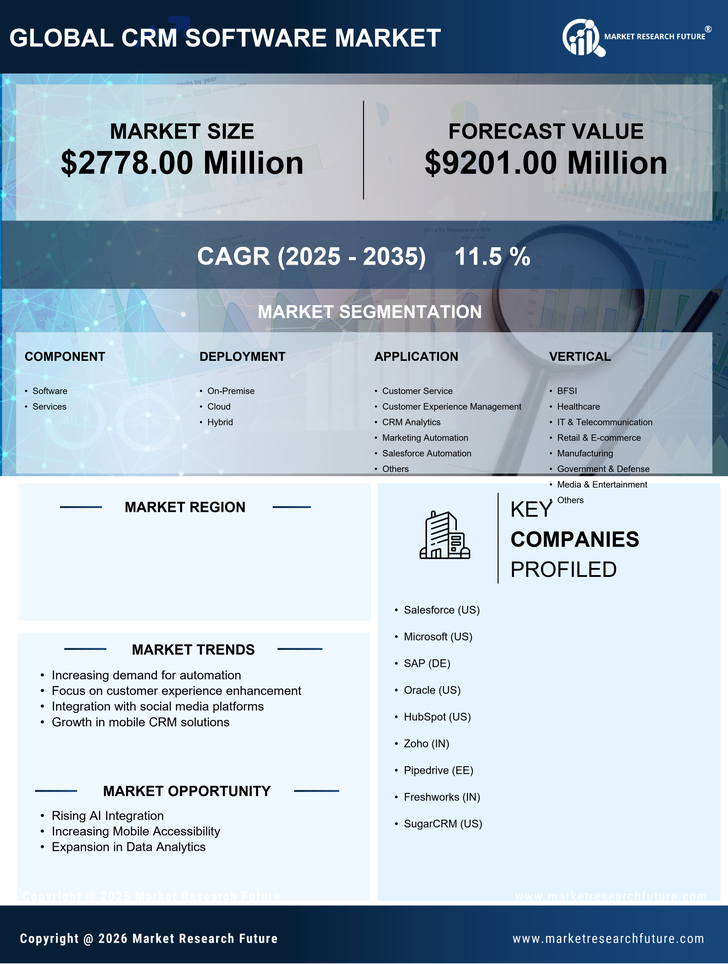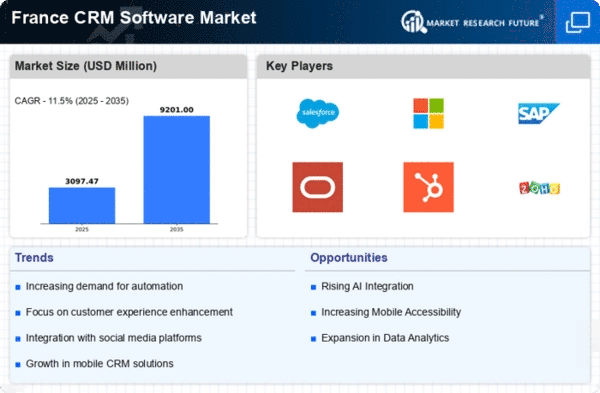The crm software market in France is characterized by a dynamic competitive landscape, driven by rapid technological advancements and evolving customer expectations. Major players such as Salesforce (US), Microsoft (US), and SAP (DE) are at the forefront, each adopting distinct strategies to enhance their market presence. Salesforce (US) continues to innovate with its AI-driven solutions, focusing on customer engagement and personalized experiences. Microsoft (US) leverages its extensive ecosystem, integrating its crm offerings with other enterprise solutions to provide a seamless user experience. Meanwhile, SAP (DE) emphasizes its stronghold in enterprise resource planning (ERP) by integrating crm functionalities, thereby appealing to large organizations seeking comprehensive solutions. Collectively, these strategies foster a competitive environment that prioritizes innovation and customer-centricity.
Key business tactics within the crm software market include localized service offerings and strategic partnerships aimed at enhancing customer support and product accessibility. The market structure appears moderately fragmented, with a mix of established players and emerging startups. This fragmentation allows for diverse offerings, yet the influence of key players remains substantial, as they set benchmarks for technology and service standards.
In October 2025, Salesforce (US) announced a strategic partnership with a leading AI firm to enhance its predictive analytics capabilities. This move is likely to bolster Salesforce's position in the market by providing clients with advanced tools for customer insights, thereby improving decision-making processes. The integration of AI into their platform may also attract new customers seeking cutting-edge technology.
In September 2025, Microsoft (US) launched a new version of its Dynamics 365 suite, incorporating enhanced automation features aimed at streamlining sales processes. This development is significant as it reflects Microsoft's commitment to continuous improvement and adaptation to market needs, potentially increasing its market share among small to medium-sized enterprises looking for efficient solutions.
In August 2025, SAP (DE) expanded its crm capabilities by acquiring a niche player specializing in customer data platforms. This acquisition is indicative of SAP's strategy to enhance its data-driven approach, allowing for more personalized customer interactions. Such strategic moves not only strengthen SAP's product offerings but also position it favorably against competitors who may lack similar capabilities.
As of November 2025, the crm software market is increasingly defined by trends such as digitalization, AI integration, and a growing emphasis on sustainability. Strategic alliances are becoming more prevalent, as companies recognize the value of collaboration in enhancing their technological capabilities. Looking ahead, competitive differentiation is likely to evolve, shifting from traditional price-based competition to a focus on innovation, technological advancement, and supply chain reliability. This transition suggests that companies will need to invest in research and development to maintain a competitive edge in an ever-evolving market.

















